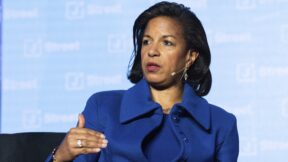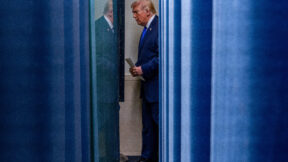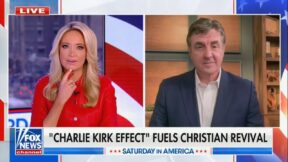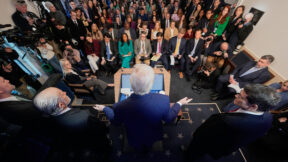Reporter Asks Kamala Harris ‘Will This Be The Most Expensive Christmas In History?’
ABC News reporter Sarah Kolinovsky asked Vice President Kamala Harris about inflation in dramatic terms, wondering aloud “Will this be the most expensive Christmas in history?”
On Friday, Harris held a press conference to punctuate her trip to France, and took questions from American and French reporters on a range of issues — including multiple questions about the inflation that has garnered so much media attention.
Bloomberg’s Jennifer Jacobs was first to bring up the subject, but it was Kolinovsky who put the topic in the most dramatic terms, prompting a detailed response from the VP:
MS. KOLINOVSKY: Thank you, Madam Vice President. A follow-up to Jen’s question on inflation: For Americans at home who are feeling the economic pinch, when do you expect they can expect to feel relief? You mentioned Christmas in your remarks. Will this be the most expensive Christmas in history after the most expensive Thanksgiving in history?
And then, on one of the provisions in the Build Back Better bill: paid family leave. Here in France, women are offered 16 weeks of paid maternity leave; fathers are offered 28 days. Is it frustrating to you that the U.S. can’t secure the same for American parents? And why is paid family leave not a red line in this package for this administration?
THE VICE PRESIDENT: So, on the inflation piece: We, as I said earlier, fully appreciate the significance of things costing more. It’s a big deal. It’s a big deal.
And so, we are doing what we can, making it probably one of our highest priorities — I talk to the President about it often — one of our highest priorities. We need to bring cost down for the American people and, in particular, for working people and working families.
And again — I’ll go back to my previous point — that is why we have been pushing so hard since the beginning for Build Back Better, because it is absolutely and almost uniquely designed to do just that — to make it easier for people to live. And, for most Americans, making it easier for them to live means bringing the cost of living down, especially for essential services.
On the piece about paid family leave: Yes, it’s frustrating. It’s something I’ve been advocating for for years, as has the President, and it was in our initial proposal. And in terms of what we believe will actually address — again, a topic of conversation — the topic of conversation on the mainstage yesterday — inequities, the inequality of systems and structures.
We know that this is an issue that disproportionately affects women and working women. We know that in the United States — and I know around the world — we have seen working women, because of the pandemic, leave the workforce at the rate in the United States; the most recent number I saw is somewhere around 2 million women have left the workforce.
And let’s be clear about this: An issue that impacts working women not only directly impacts the economy of their household, it impacts the economy of our whole society.
When you lift up the economic status of women, you necessarily lift up the economic status of families, and all of society benefits.
So, yes, I’m frustrated. And it is, I think, a shame that we are not yet a leader on this. We have work to do. And that is why the President and I are committed to doing this work. It’s important, and it matters.
And again, I’ll go back to my previous point: You know, there are those of us who have been fighting for this for a long time, and there are many more who perhaps kind of heard about it but really saw it during the pandemic.
I mean, most recently, I had the TV on but I was doing some- — I was in a briefing, I think, so I was doing something else, so I didn’t hear. But it was an image of somebody doing a Zoom, and their — one child came in — (laughs) — and then the toddler came in after that, and then somebody came in and grabbed the two kids. And then, yesterday, we saw a different example of that. But, yeah, it’s a big issue.
The October inflation report showed a 30-year high, but the Biden administration and some economists chalk it up to temporary effects of the once-in-a-century pandemic.
Watch above via Reuters.
New: The Mediaite One-Sheet "Newsletter of Newsletters"
Your daily summary and analysis of what the many, many media newsletters are saying and reporting. Subscribe now!






Comments
↓ Scroll down for comments ↓